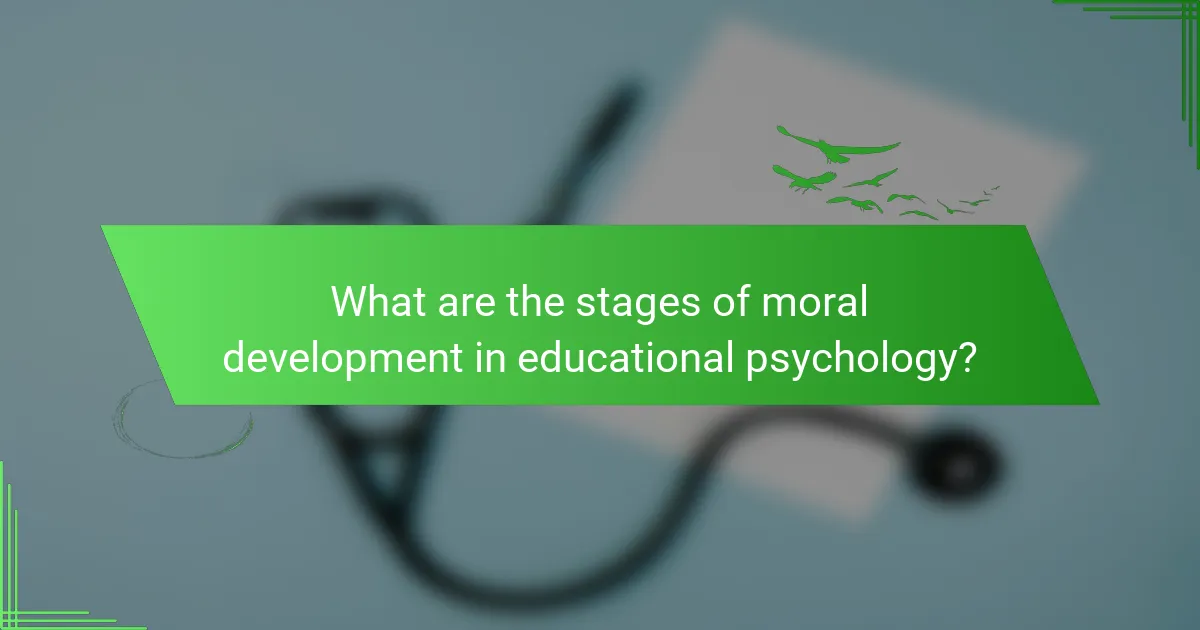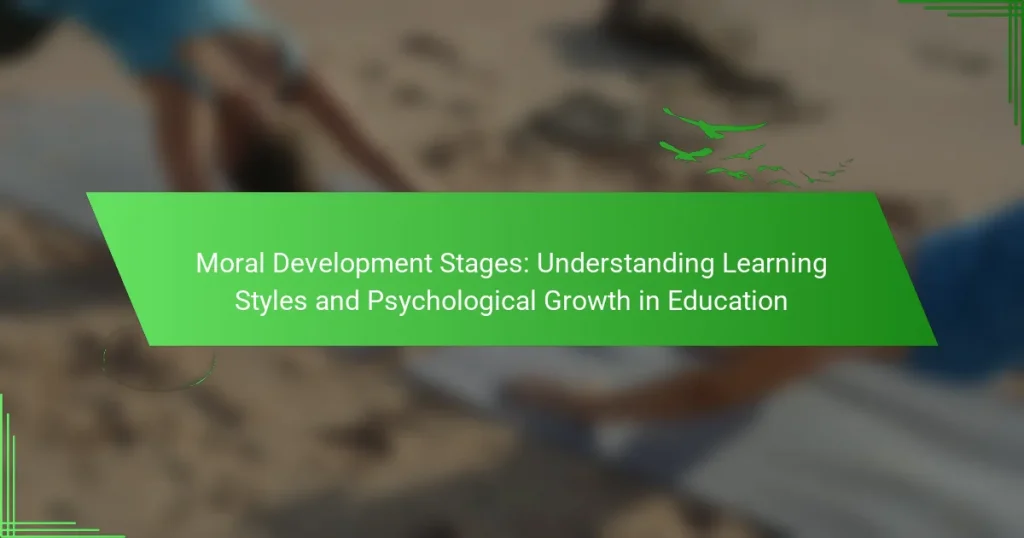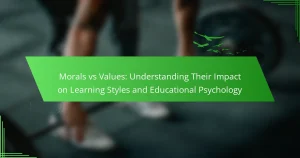Understanding the stages of moral development is crucial for enhancing ethical reasoning in education. This article explores the pre-conventional, conventional, and post-conventional stages of moral understanding. It discusses how educators can apply these stages through tailored teaching strategies and group activities. Additionally, the role of regular reflection in promoting psychological growth and ethical awareness among students is examined.

What are the stages of moral development in educational psychology?
Moral development in educational psychology unfolds through distinct stages that reflect learners’ ethical reasoning. The stages include pre-conventional, conventional, and post-conventional levels, each characterized by unique attributes of moral understanding.
1. Pre-conventional stage: Focuses on obedience and self-interest. Children obey rules to avoid punishment or gain rewards.
2. Conventional stage: Emphasizes social approval and maintaining order. Individuals conform to societal norms and expectations.
3. Post-conventional stage: Involves abstract reasoning and ethical principles. Individuals prioritize justice and universal human rights over societal rules.
Understanding these stages aids educators in tailoring teaching strategies to foster moral reasoning in students.
How do learning styles influence moral development?
Learning styles significantly influence moral development by shaping how individuals process ethical dilemmas. Visual learners may grasp moral concepts through imagery, while auditory learners benefit from discussions. Kinesthetic learners engage with moral scenarios through role-playing. These styles affect the internalization of values and ethical reasoning, leading to unique developmental pathways. For instance, students who engage actively with moral issues often demonstrate higher empathy and critical thinking skills. Understanding these differences allows educators to tailor approaches, fostering a more inclusive environment for moral growth.
What are the key learning styles recognized in education?
The key learning styles recognized in education include visual, auditory, and kinesthetic. Visual learners benefit from diagrams and charts, auditory learners excel with lectures and discussions, while kinesthetic learners prefer hands-on activities. Understanding these styles enhances moral development stages by tailoring educational approaches to individual needs.
How do these learning styles correlate with moral reasoning?
Learning styles significantly influence moral reasoning development. Visual learners may grasp moral concepts through imagery, while auditory learners benefit from discussions. Kinesthetic learners often engage in role-playing scenarios, enhancing their understanding of ethical dilemmas. Each style offers unique pathways for moral growth, fostering diverse perspectives in educational settings.
What universal attributes define moral development stages?
Moral development stages are defined by universal attributes such as cognitive understanding, emotional awareness, and social context. These attributes shape how individuals perceive right and wrong as they progress through distinct developmental phases. Each stage reflects increasing complexity in moral reasoning, influenced by factors like age, experience, and education. The unique attribute of moral development lies in its ability to adapt to cultural and situational contexts, highlighting the dynamic nature of ethical growth.
What are the common characteristics of each stage?
The common characteristics of each stage in moral development include distinct cognitive and emotional processes. These stages are characterized by increasing complexity in moral reasoning, from obedience to authority in early stages to principled conscience in advanced stages. Each stage reflects a unique attribute of moral understanding, influenced by social interactions and personal experiences.
1. Pre-conventional: Focus on self-interest and avoiding punishment.
2. Conventional: Emphasis on societal norms and maintaining relationships.
3. Post-conventional: Prioritization of universal ethical principles and justice.
How does age affect moral reasoning development?
Age significantly influences moral reasoning development. Younger individuals often rely on concrete rules, while older individuals demonstrate more complex, abstract thinking. This progression aligns with cognitive growth stages identified by developmental psychologists.
Research indicates that moral reasoning evolves through distinct stages. For instance, children typically exhibit a focus on obedience and punishment, whereas adolescents begin to consider social contracts and individual rights. By adulthood, moral reasoning often reflects universal ethical principles.
The transition through these stages suggests that age-related experiences and cognitive maturity enhance one’s ability to engage in nuanced moral discussions. As a result, educators can tailor learning approaches to align with the moral development stages of their students, fostering deeper ethical understanding.
What unique attributes differentiate moral development theories?
Moral development theories differ primarily in their unique attributes, including the stages of development, underlying psychological principles, and the role of social influences. For example, Kohlberg’s theory emphasizes moral reasoning stages, while Gilligan’s approach focuses on care ethics. These distinctions highlight how each theory interprets moral growth and the factors influencing it.
How do various theorists conceptualize moral development?
Various theorists conceptualize moral development through distinct stages that reflect psychological growth. Jean Piaget identified two primary stages: the heteronomous morality stage, where rules are seen as absolute, and the autonomous morality stage, where individuals recognize the importance of intentions. Lawrence Kohlberg expanded this framework with his three levels of moral reasoning: pre-conventional, conventional, and post-conventional, each containing two stages that represent a progression from self-interest to universal ethical principles. Carol Gilligan critiqued Kohlberg’s model, emphasizing an ethic of care and relational dynamics, highlighting gender differences in moral reasoning. These frameworks illustrate the complexity of moral development, integrating cognitive, emotional, and social dimensions.
What role does cultural context play in these theories?
Cultural context significantly influences moral development theories by shaping values and beliefs. Different cultures prioritize distinct moral attributes, impacting how individuals progress through moral stages. For example, collectivist societies may emphasize community and relationships, while individualistic cultures might focus on personal rights and autonomy. This variation affects educational approaches, as educators must consider cultural backgrounds to foster effective moral reasoning and psychological growth. Understanding these cultural nuances enhances the relevance of moral development stages in diverse educational settings.
What are the rare attributes that impact learning styles and moral growth?
Rare attributes that impact learning styles and moral growth include individual cognitive flexibility, emotional intelligence, and social context awareness. These attributes influence how learners adapt their approaches and values in educational settings. Cognitive flexibility allows students to switch between different thinking strategies, enhancing problem-solving skills. Emotional intelligence fosters empathy and ethical reasoning, crucial for moral development. Social context awareness shapes learners’ understanding of diverse perspectives, promoting inclusivity and moral reasoning. Together, these rare attributes contribute significantly to the interplay between learning styles and moral growth.
How can individual differences affect moral reasoning?
Individual differences significantly influence moral reasoning by shaping perspectives and decision-making processes. Factors such as cognitive development, emotional intelligence, and cultural background contribute to diverse moral frameworks. For instance, individuals with higher cognitive complexity often engage in more nuanced moral reasoning. Emotional intelligence enables better empathy, influencing moral judgments. Cultural contexts provide unique values that guide moral decisions, highlighting the role of socialization in moral development. These attributes illustrate how personal experiences and traits shape the understanding of right and wrong.
What infrequent factors contribute to moral dilemmas in education?
Infrequent factors contributing to moral dilemmas in education include cultural differences, personal biases, and unexpected consequences. Cultural differences may lead to varying interpretations of ethical standards, complicating decision-making. Personal biases can cloud judgment, causing educators to favor specific viewpoints. Unexpected consequences arise when actions taken to resolve issues lead to unforeseen ethical conflicts, challenging moral frameworks in educational settings.

How can educators apply moral development theories in the classroom?
Educators can effectively apply moral development theories by integrating them into lesson plans and classroom discussions. This approach fosters moral reasoning and ethical decision-making among students.
For instance, using Kohlberg’s stages of moral development, educators can create scenarios that challenge students to evaluate moral dilemmas. This encourages critical thinking and helps students understand different perspectives.
Additionally, incorporating group activities allows students to collaborate and discuss moral issues, reinforcing their understanding through social interaction. This aligns with the unique attribute of peer influence in moral development.
Regular reflection on moral choices can further deepen students’ psychological growth, promoting a classroom environment centered on ethical awareness and personal responsibility.
What best practices can enhance moral growth through learning styles?
Engaging diverse learning styles enhances moral growth by fostering empathy, critical thinking, and ethical reasoning. Tailoring educational approaches to individual preferences promotes deeper understanding and personal reflection on moral dilemmas. For example, experiential learning encourages students to confront real-world ethical challenges, reinforcing moral development. Integrating collaborative projects nurtures social responsibility, as learners work together and appreciate different perspectives.
What common mistakes should educators avoid in fostering moral development?
Educators should avoid common mistakes that hinder moral development, such as neglecting individual learning styles, failing to model ethical behavior, and overlooking the importance of reflective practices. These errors can impede psychological growth and the effectiveness of moral education. Recognizing diverse moral development stages is crucial for fostering an inclusive learning environment. Additionally, educators must ensure that discussions around morality are relevant and engaging to promote deeper understanding and application of moral principles.
How can psychological growth be measured in educational settings?
Psychological growth in educational settings can be measured through various assessment tools and observation methods. These methods include standardized tests, formative assessments, and qualitative observations of student behavior and engagement.
Standardized tests evaluate cognitive and emotional development, providing quantifiable data. Formative assessments, such as quizzes and assignments, offer insights into learning progress and adaptability. Observational methods focus on social interactions and moral reasoning, highlighting stages of moral development.
By integrating these measurement tools, educators can gain a comprehensive understanding of students’ psychological growth and tailor their teaching strategies accordingly.
What expert insights can guide effective moral education strategies?
Effective moral education strategies can be guided by expert insights that emphasize developmental stages and learning styles. Understanding the psychological growth of students enhances moral reasoning and ethical behavior.
Educators should adopt a stage-based approach, recognizing that moral development progresses through identifiable phases, each requiring tailored teaching methods. For example, younger students may benefit from concrete examples, while older students can engage in abstract discussions about ethical dilemmas.
Incorporating diverse learning styles is crucial. Some students may respond better to visual aids, while others might prefer discussions or hands-on activities. This adaptability can significantly improve engagement and retention of moral concepts.
Regular assessment and reflection are essential components. Educators should encourage students to reflect on their moral beliefs and the reasoning behind them. This practice fosters critical thinking and personal growth, reinforcing the importance of moral education in developing responsible citizens.




